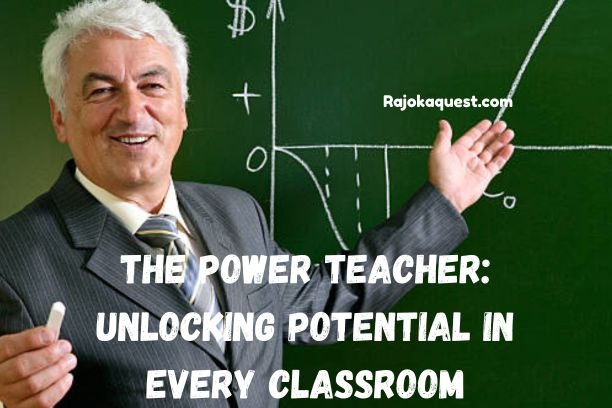The Power Teacher: Unlocking Potential in Every Classroom

The power teacher
The Power Teacher: Unlocking Potential in Every Classroom
A teacher’s responsibilities go well beyond imparting knowledge. Teachers who inspire their students to fulfil their aspirations and create the basis for a better society can shape young brains. But just what makes a teacher effective? And how might teachers use this ability to produce excellent and long-lasting effects on their pupils? In this post, we probe the core of what it means to be a “power teacher” and discuss how teachers could best optimize their impact.
What Defines a Power Teacher?
Not just any teacher; a “power teacher” is one who goes above and beyond to ensure that their students are not only learning but also flourishing. These teachers have certain special abilities that help them establish an environment in which learning is interesting and significant by connecting with their pupils on a deeper level.
Characteristics of a POWER Teacher
- Empathy and Understanding:
Power teachers do care about their pupils. Empathy and understanding abound. They know every child has different backgrounds and experiences that mould their learning. Teachers who show empathy help to establish trust, which facilitates students’ openness and participation in the course of instruction.
- Teachers’ Passion:
A True power teacher loves what they do. Students inspired by this contagious enthusiasm start actively participating in their education. Students are more likely to get excited when their teachers find the content interesting.
- Adaptability:
Every classroom is unique; hence, what suits one group of pupils may not work for another. Power teachers are flexible, applying several teaching strategies and instruments to meet their students’ demands.
- Patience:
Learning is a process; therefore, not all pupils pick ideas at the same speed. Patience and the required time for students to fully grasp the content, as shown by power teachers, help them.
- Strong Communication Skills:
Teaching mostly depends on communication. Power teachers are pretty skilled in clearly and simply elucidating challenging ideas. They also pay attention to their students and offer helpful, motivating comments.
The Impact of Power Teachers on Student Success
The impact of a strong teacher might go much beyond the classroom. Positive interactions with their teachers have been linked in studies to improved academic performance, better behaviour, and higher self-esteem among pupils. Let’s look at some particular ways in which power teachers might influence student achievement.
Boosting Academic Achievement
Power teachers design a classroom where students can make errors and take calculated chances. This inspires pupils to aim for excellence and challenge themselves. Power teachers enable students to define and reach their academic goals by offering clear standards and helpful criticism.
Encouraging Social and Emotional Development
School is where pupils learn to engage with others and grow their social abilities in addition to their intellectual development. Most importantly, teaching pupils how to control their emotions, handle problems, and collaborate with others requires the help of powerful teachers. Success, whether inside or outside of the classroom, depends on these abilities.
Building Lifelong Learning
A good teacher doesn’t just educate; they inspire a love for learning that lasts a lifetime. Power teachers inspire students to remain curious and continue their quest for knowledge even after they leave the classroom by making learning fun and pertinent. In a society that is always changing and developing, this lifetime passion for learning is essential.
Strategies to Become a Power Teacher
One does not become a power teacher overnight. It calls for ongoing self-examination, education, and commitment to the profession of instruction. These are some techniques teachers could apply to improve their lessons and increase their authority in their positions.
1. Develop Strong Relationships with Students
Being a power teacher starts with a solid, good rapport with the kids. Please get to know your pupils personally, learn about their hobbies, and demonstrate your concern for their achievement. Students who feel appreciated and understood are likelier to participate in learning.
2. Establish an inclusive classroom Environment
An inclusive classroom is one in which every pupil finds worth and welcome. This entails appreciating variety and making sure every student has equal access to educational possibilities. Choose instructional resources that represent several points of view and foster a culture based mostly on respect and compassion in your classroom.
3. Use Innovative Teaching Methods
Power teachers are not hesitant to try out fresh approaches to instruction. Add technology, practical exercises, and project-based learning to increase the interactive nature of classes. Changing your approach to instruction will help you engage pupils in many learning styles and keep their curiosity
4. Provide Constructive Feedback
Though it is a necessary component of learning, feedback must be constructive if it is to be beneficial. Power teachers give specifically targeted, practical advice that is motivating. Emphasize the student’s areas of strength and offer specific direction on how they could develop. Recall that the intention is not to criticize but to teach and flourish.
5. Encourage a Growth Mindset
The theory of a growth mindset is that hard effort and dedication can help one gain intelligence and skills. By rewarding effort instead of natural talent and educating students that mistakes are a necessary component of the learning process, power teachers help students adopt a growth mindset. Students who feel they can grow are more likely to keep on in the face of difficulty.
6. Engage in Professional Development
One of the professions that calls for constant learning is teaching. Power teachers are dedicated to their professional growth and seek fresh knowledge and skills to improve their instruction. To keep current with the most recent instructional research and trends, attend seminars, join professional organizations, and work with colleagues.
7. Promote Student Autonomy
Giving children a voice in their education is crucial and power teachers realize. Urge students to create their own objectives, select projects they enjoy, and own their learning. Students who participate in choosing what and how they learn are more engaged in their education.
8. Integrate Social and Emotional Learning (SEL)
The development of a learner depends on social and emotional learning (SEL). Power teachers include SEL in their courses by guiding students toward emotional management, goal setting, empathy for others, and preservation of good connections. Success in the classroom, as well as personally, depends on these abilities.
9. Be Reflective
Power teachers routinely reassess their approach to instruction. Spend some time following every lesson thinking about what went right and what might be changed. Reflective practice lets teachers grow from their past and raise their performance.
The Power of Teacher Collaboration
Power teachers know they travel a road not taken alone. Working with other teachers offers fresh ideas, viewpoints, and encouragement. Teachers working together can share best practices, create innovative teaching tactics, and provide a better, more integrated classroom for their pupils.
The Advantages of Teacher Collaboration
- Shared Knowledge and Expertise: Working together with colleagues lets teachers exchange their knowledge and experience. This kind of intellectual interaction can help to create creative teaching plans and raise general standards of instruction.
- Support and Encouragement: Teaching can be a challenging career, thus having a network of encouraging peers can be pretty significant. When needed, power teachers help and encourage one another.
- Improved Student Outcomes: Research indicates that teacher cooperation results in better student outcomes. Teachers can offer a more complete and successful education when they cooperate to schedule courses, evaluate student development, and handle problems.
Challenges Power Teachers Face
Being a power instructor has many difficulties, even if it is quite fulfilling. Knowing these difficulties will enable teachers to be ready for and able to overcome them, guaranteeing their ability to continue giving their children the best possible education.
1. Burnout
Power teachers frequently go above and beyond to help their kids; teaching is hard. Burnout—characterized by tiredness, dissatisfaction, and a decline in efficacy—may follow. Teachers who take care of their personal well-being, establish limits, and ask for help when needed will help prevent burnout.
2. Balancing Personal and Professional Life
Though they are driven about their work, power teachers must strike a balance between their personal and professional lives. Teachers can prevent feeling overburdened and rejuvenated by scheduling family, leisure, and hobby time.
3. Managing Instruction Policies
Teachers often struggle to keep up with the always-shifting educational regulations and requirements. Power instructors must advocate for their pupils’ needs and keep current on policy developments. Participating actively in the decision-making process will help educators properly negotiate these changes.
4. Accommodating Different Student Needs
Every pupil is different, hence power teachers are dedicated to satisfy the several wants of every one of their charges. This can be not easy, particularly in big classes with few resources. Power teachers must be innovative and adaptable in their approaches and, when needed, look for extra tools and help in order to handle this.
The Future of Power Teaching
The teacher’s job is constantly changing, and it can be challenging. However, the fundamental ideas of power education remain the same: building solid relationships, encouraging a love of learning, and enabling students to realize their most significant potential. Power teachers will be increasingly important in determining the direction of education as it develops and in arming the following generation for success.
Conclusion
A teacher’s influence is unbounded. The special talent of power teachers is to inspire, encourage, and change the lives of their students. Strong relationships, an inclusive and interesting classroom environment, and constant improvement of their teaching technique will help teachers potential unleash every student’s potential. The job of the power teacher is to unleash every student’s potential and always-shifting circumstances. Teachers who embrace the ideas and techniques of power teaching will have a long-lasting effect beyond the classroom.
Henry Adams said, “A teacher affects eternity; he can never tell where his influence ends.” An influential teacher has an unlimited influence on the hearts and brains of the essive generations, creating a better future for all.
Read more, Click here.



